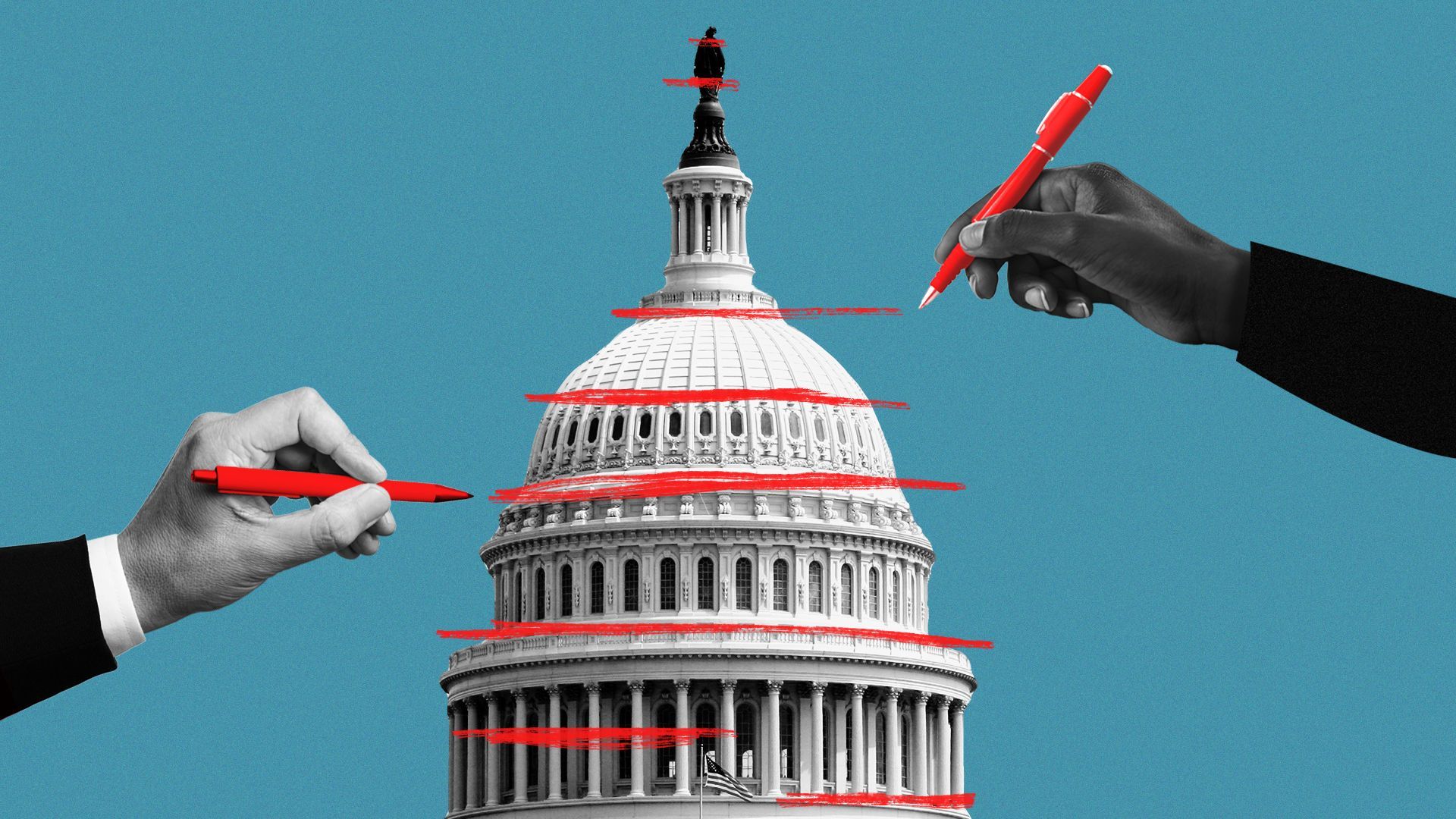Plus, hospitals on defensive | Thursday, April 27, 2023
| | | | | | | Presented By Optum Rx | | | | Axios Vitals | | By Tina Reed · Apr 27, 2023 | | It's Thursday, folks. Today's newsletter is 828 words or a 3-minute read. Situational awareness: House Republicans on Wednesday narrowly passed legislation to raise the debt ceiling that includes Medicaid work requirements - But the bill is going nowhere with Senate Democrats and the White House remains firmly opposed.
| | | | | | 1 big thing: Hospitals put on defensive over site-neutral payments |  | | | Illustration: Shoshana Gordon/Axios | | | | Momentum is building in Congress to address the way hospitals charge more for the same services private doctors deliver in their offices — a sign of broader lawmaker frustration with the industry. Driving the news: Lawmakers on the House Energy and Commerce Committee showed bipartisan interest Wednesday in changing Medicare payment policies to pay the same for some services, regardless of where they're delivered. - The idea tracks with past recommendations from MedPAC but is staunchly opposed by industry groups like the American Hospital Association, which says the policy change would be economically ruinous as its members continue to manage the aftermath of the pandemic, along with workforce and supply chain issues.
Catch up quick: Medicare lets hospital-owned clinics be designated as outpatient departments and net a higher payment for certain services than if they were owned by clinicians. - Proponents of "site-neutral payments" say current practice is driving more hospital consolidation and buyouts of doctors' offices, and that changes could save Medicare billions of dollars.
- As Axios' Arielle Dreher and Peter Sullivan previously reported, site-neutral payment reforms could save Medicare upward of $100 billion over a decade.
Driving the news: An unusually diverse group of think tanks and policy experts launched a push this week for site-neutral payments in Medicare, Axios' Victoria Knight reports. - Proponents include the Koch-led Americans for Prosperity, the center-left Progressive Policy Institute and high-profile health policy scholars like Brookings Institution's Loren Adler and the American Enterprise Institute's Brian Miller.
- Major hospital groups are fighting back, saying the way they are paid needs to be eyed through a broader lens of regulatory requirements that fall on their shoulders.
- "Hospitals have so much more that's asked of them," Stacey Hughes, AHA's executive vice president for government relations and public policy said.
Go deeper. Some of the reporting in this story was published first on Axios Pro. Get news like this by subscribing. Use code POLICY100 which gives you $100 off. |     | | | | | | 2. Kaiser Permanente to acquire Geisinger |  | | | Photo: Paul Weaver/SOPA Images/LightRocket via Getty Images | | | | Kaiser Permanente on Wednesday announced plans to acquire Pennsylvania nonprofit Geisinger Health in what, if approved, would be the biggest hospital acquisition so far this year, Axios' Arielle Dreher writes. Why it matters: The deal marks the beginning of an expansion for Kaiser Permanente, which plans to add five or six more health systems to its Risant Health network in the next five years and invest $5 billion in the enterprise. The details: Risant Health is the new vehicle Kaiser wants to use to expand value-based care and develop a new platform that health systems can use including best practices, tools and technology. - The Kaiser-Geisinger deal is expected to close in early 2024.
Share this story. |     | | | | | | 3. Migrant children face health care hurdles | | The tens of thousands of migrant children who cross the U.S. border alone face myriad challenges accessing health care once they are released to their families, the Texas Tribune reports. Driving the news: A report released this week by the Migration Policy Institute and the American Academy of Pediatrics examined the barriers unaccompanied minors face accessing care. - In many states, the children are unable to access health coverage to pay for mental health services that could, for example, address emotional trauma they often experience on their journey, the report found.
What they're saying: "Given that unaccompanied children will be in the United States for several years and many ultimately remain in the country permanently, ensuring they are healthy, protected and able to contribute to their communities benefits society more broadly," said Tamar Magarik Haro, a senior director at American Academy of Pediatrics, per the Tribune. |     | | | | | | A message from Optum Rx | | Driving choice, transparency and affordability in pharmacy benefits | | |  | | | | Optum Rx is working to promote choice and competition to make prescription drugs more affordable. As biosimilars come to market, we're providing flexibility and choice to patients and their providers, while encouraging biosimilar competition to help lower costs. Learn more. | | | | | | 4. Data du jour: The pandemic's hungriest |  Data: National Center for Health Statistics, National Health Interview Survey, 2021; Chart: Axios Visuals Hunger rates were highest among Black and Latino households, women and adults with disabilities in a snapshot of the COVID-19 pandemic, according to new Centers for Disease Control and Prevention data, Axios' Ayurella Horn-Muller writes. Why it matters: The detailed look at who is most vulnerable to food insecurity comes at a time when a long-standing congressional fight over food stamps has become a central issue in the debt limit debate. By the numbers: When compared to white and Asian adults, family food insecurity was highest among non-Hispanic adults who identified with multiple races (12.7%); closely followed by Black adults (12.2%). - Hispanic adults (8%) were more likely to live in families experiencing food insecurity than white (4.1%) or Asian adults (3.7%), but less likely to live in families experiencing food insecurity than Black adults.
- The analysis also found that single parent-households faced higher rates of food insecurity than married adults with no dependents.
Read the rest. |     | | | | | | 5. Catch up quick | | 💊 Medicare will cover the Alzheimer's drug Leqembi for all patients if FDA approves drug, CMS chief says. (CNBC) 📈 Humana's profits jump more than 33% in the first quarter. (Modern Healthcare) 👀 GoodRx taps former GoDaddy exec Scott Wagner as interim CEO as founders step down from top leadership role. (Fierce Healthcare) |     | | | | | | A message from Optum Rx | | Empowering more choice and transparency | | |  | | | | Optum Rx is offering new payment choices and transparency solutions to the customers we serve. We believe our customers are best positioned to determine the affordability and transparency solutions that best meet their pharmacy benefit needs. Learn more about our pharmacy benefit solutions. | | | | Thanks for reading, and thanks to senior health care editor Adriel Bettelheim and senior copy editor Bryan McBournie for the edits. |  | | Dive deeper into the future of health care | | | | | | Axios thanks our partners for supporting our newsletters.
Sponsorship has no influence on editorial content. Axios, 3100 Clarendon Blvd, Arlington VA 22201 | | | You received this email because you signed up for newsletters from Axios.
To stop receiving this newsletter, unsubscribe or manage your email preferences. | | | Was this email forwarded to you?
Sign up now to get Axios in your inbox. | | | | Follow Axios on social media:    | | | | | |
No comments